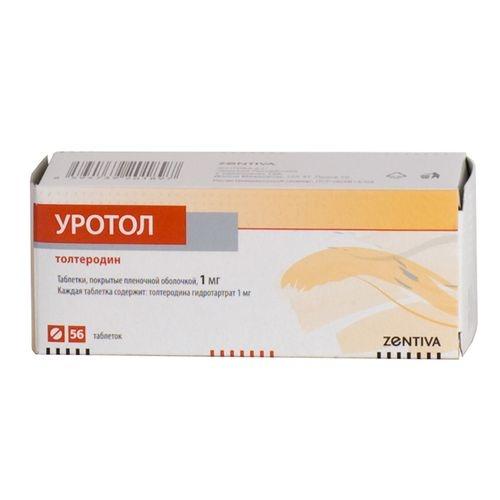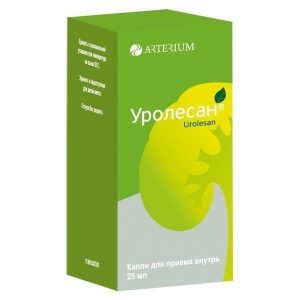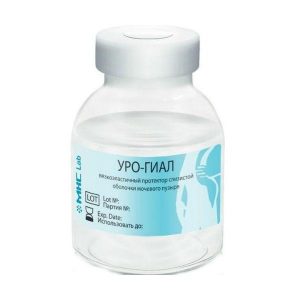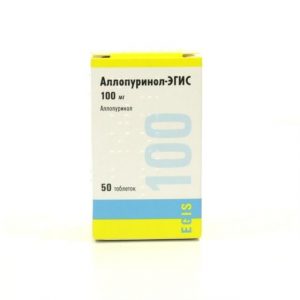Description
Latin name
UROTOL
Release form
film-coated tablets.
Packing
56 pcs
Pharmacological action
Pharmacodynamics
M-anticholinergic.
Both tolterodine and its 5-hydroxymethyl derivative are highly specific for muscarinic receptors, competitively block m-cholinergic receptors with the highest selectivity for bladder receptors (compared with salivary gland receptors).
The drug reduces the tone of the smooth muscles of the urinary tract, the contractile activity of the detrusor, and also reduces salivation.
In doses exceeding therapeutic, causes incomplete emptying of the bladder and increases the amount of residual urine.
The therapeutic effect of tolterodine is achieved after 4 weeks.
Tolterodine does not inhibit CYP2D6, 2C19, 3A4 or 1A2.
Pharmacokinetics
Absorption
After oral administration, tolterodine is rapidly absorbed from the digestive tract. Serum C max is reached after 1-2 hours.
In the therapeutic dose range (1-4 mg), there is a linear relationship between the serum C max value and the dose of the drug.
The absolute bioavailability of tolterodine is 65% in individuals with CYP2D6 deficiency and 17% in most patients.
Food does not affect the bioavailability of the drug, although the concentration of tolterodine rises when taken with food.
Distribution of
Tolterodine and the 5-hydroxymethyl metabolite bind predominantly to the orozomcoid, unbound fractions account for 3.7% and 36%, respectively. V d tolterodine – 113 l.
Due to the difference in protein binding of tolterodine and 5-hydroxymethyl metabolite, the AUC of tolterodine in individuals with CYP2D6 deficiency is close to the sum of the AUC of tolterodine and 5-hydroxymethyl metabolite in most patients with the same dosing regimen. Therefore, the safety, tolerability and clinical effect of the drug are not dependent on the activity of CYP2D6.
Metabolism
Tolterodine is mainly metabolized in the liver by the polymorphic enzyme CYP2D6 to form a pharmacologically active 5-hydroxymethyl metabolite, which is then metabolized to 5-carboxylic acid and N-desalkylated 5-carboxylic acid. The 5-hydroxymethyl metabolite has pharmacological properties close to tolterodine and, in most patients, significantly enhances the effect of the drug.
In individuals with reduced metabolism (with CYP2D6 deficiency), tolterodine undergoes dealkylation with CYP3A4 isoenzymes with the formation of N-desalkylated tolterodine, which does not have pharmacological activity.
Excretion of
Systemic clearance of tolterodine in serum in most patients is about 30 l / h. After taking the drug T 1/2, tolterodine is 2-3 hours, and the 5-hydroxymethyl metabolite is 3-4 hours. In people with a reduced metabolism, T 1/2 is about 10 hours.
A decrease in clearance of the parent compound in patients with CYP2D6 deficiency leads to increase the concentration of tolterodine (about 7 times) against the background of undetectable concentrations of 5-hydroxymethyl metabolite.
Approximately 77% of tolterodine is excreted in urine and 17% in feces. Less than 1% of the dose is excreted unchanged and about 4% in the form of a 5-hydroxymethyl metabolite. 5-carboxylic acid and N-desalkylated 5-carboxylic acid comprise, respectively, about 51% and 29% of the amount excreted in the urine.
Pharmacokinetics in special clinical cases
The AUC of tolterodine and its active 5-hydroxymethyl metabolite is increased by about 2 times in patients with cirrhosis.
The average AUC of tolterodine and 5-hydroxymethyl metabolite is 2 times higher in patients with severe renal impairment (glomerular filtration rate 30 ml / min). The plasma content of other metabolites in these patients is significantly higher (12 times). The clinical significance of increasing the AUC of these metabolites is unknown.
Indications
Hyperreflexia (hyperactivity, instability) of the bladder, manifested by: frequent, imperative urges to urinate, frequent urination, urinary incontinence.
Contraindications
Urinary retention
untreatable angle-closure glaucoma
myasthenia gravis
severe ulcerative colitis
megacolon
up to 18 years of age
increased sensitivity to the component.
With caution, the drug is prescribed for: severe obstruction of the lower urinary tract due to the risk of urinary retention, an increased risk of decreased gastrointestinal motility, obstructive gastrointestinal diseases (eg, pyloric stenosis), renal or hepatic insufficiency (daily dose should not exceed 2 mg), diaphragm hernia .
Use during pregnancy and lactation
Use of Urotol during pregnancy is possible only if the intended benefit of the therapy for the mother outweighs the potential risk to the fetus.
Since data on the excretion of tolterodine with breast milk are not available, the use of the drug during lactation should be avoided.
Women of childbearing age should use reliable methods of contraception during treatment with Urotol.
Composition
1 coated tablet contains:
Active ingredient: tolterodine * hydrotartrate 1 mg.
Excipients: microcrystalline cellulose, sodium carboxymethyl starch (type A), colloidal silicon dioxide, sodium stearyl fumarate.
Shell composition: hypromellose 2910/5, macrogol 6000, titanium dioxide, talc.
* is the non-proprietary international name recommended by WHO – tolterodyne.
Dosage and administration
The drug is administered orally at 2 mg 2 times / day, regardless of food intake. The total dose of the drug can be reduced to 2 mg / day, based on the individual tolerance of the drug.
In case of impaired liver and / or kidney function, as well as with simultaneous use with ketoconazole or other strong CYP3A4 inhibitors, it is recommended that the dose be reduced to 1 mg 2 times / day.
The effectiveness of therapy should be reevaluated 2-3 months after the start of treatment.
Side effects of
On the part of the immune system: allergic reactions, Quincke’s edema (very rare).
From the nervous system: nervousness, impaired consciousness, hallucinations, dizziness, drowsiness, paresthesia, headache.
On the part of the organs of vision: dry eyes, impaired accommodation.
From the cardiovascular system: tachycardia, palpitations, arrhythmia (rare).
From the digestive system: dry mouth, dyspepsia, constipation, abdominal pain, flatulence, vomiting rarely – gastroesophageal reflux.
Dermatological reactions: dry skin.
Urinary system: urinary retention.
Other: fatigue, chest pain, peripheral edema, bronchitis, weight gain.
Drug Interaction
Avoid concomitant administration of Urotol with potent CYP 3A4 inhibitors such as erythromycin, and fungal infections risk of drug overdose. M-cholinomimetics reduce the effectiveness of tolterodine. Medications with anticholinergic properties increase the action of Urotol and increase the risk of side effects. Urotol attenuates the action of prokinetics (metoclopramide, cisapride).
Possible pharmacokinetic interaction of Urotol with drugs, cytochrome P450 CYP 2D6 or CYP 3A4 isoenzymes (inducers and inhibitors).
Co-administration with fluoxetine (a potent CYP 2D6 inhibitor that is metabolized to norfluoxetine, a CYP 3A4 inhibitor) leads only to a slight increase in total AUC of tolterodine and its active 5-hydroxymethyl metabolite, which is not significant.
There is no interaction of Urotol with warfarin and combination oral contraceptives (containing ethinyl estradiol / levonorgestrel).
Tolterodine is not a CYP 2D6, 2C19, 3A4, 1A2 inhibitor, therefore, no increase in the level of drugs metabolized by these isoenzymes in blood plasma when co-administered with tolterodine is anticipated.
overdose
Symptoms: paresis of accommodation, mydriasis, painful urge for urination, hallucinations, severe arousal, convulsions, respiratory failure, tachycardia, QT prolongation, delay.
Treatment: gastric lavage, activated charcoal. At development of hallucinations, strong excitement – physostigmine, at convulsions or the expressed excitement – anxiolytics of benzodiazepine structure, at the developed respiratory insufficiency – IVL, at tachycardia – beta-blockers, at urinary retention – catheterization in mydriasis – pilocarpine in the eye drops and / or transfer of the patient to a dark room.
Storage conditions
Store in a dry place.
Keep out of the reach of children.
The Expiration of
is 3 years.
Deystvuyuschee substances
Tolterodyn
Pharmacy terms of sale
Prescription
dosage form
dosage form
tablets




